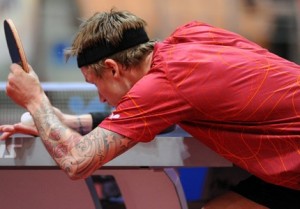How to Focus In Your Table Tennis Match?

Focus In Your Table Tennis Match
High level performance occurs when you turn off conscious thought and have an external focus. Don’t think about what you are doing or how you are doing it, think outside yourself, fix your attention on the opponent or the outcome.
Above all silence your self-critical thoughts and allow the automated process, the hundreds of hours of training which have built up in your brain and body to flow naturally. The body knows how to perform, give it the freedom to do this.
Conscious thought interferes with automated reactions, the conscious is always slower than the subconscious and will limit what you can achieve. Scientific tests have proved that the world’s top performers have little or no prefrontal cortex activity when they compete, they are not thinking about what they are doing.
Lesser performers have much more activity in this area of the brain and perform at a lesser level as a result. When top performers are asked to think more about what they are doing or how they are doing it, they get worse: when beginners are asked to focus their attention away from their own body and self towards an outward point, they improve dramatically. The only thinking which should occur in a competitive situation is that of tactical input and this should be kept to a minimum and not be clouded by emotion.
Of course we all face stress at one time or another, but we must face up to the fact that stress within a sporting event can be good or bad. It’s how we cope with it that is the defining factor! We need to try and keep emotion out of the equation, emotion as well as too much or the wrong kind of conscious thought destroys the harmony of body and mind and stops the flow of performance.
Try to be calm at all times, to control your reaction to the stimuli or situation you are facing, by thinking positively and not just reacting o
n your primitive instincts. This will give you the best chance of making good decisions, which can turn a performance around. The thinking however too must not be in the direction of criticizing what you are doing or have done or how you are performing, but rather in evaluating what you need to do to redress the situation. Such an evaluation requires you to be objective and to assess what you need to do in a composed and logical manner.
Of course once you have made a calm and speedy assessment of the tactics required, you should then again turn off the conscious thought and resume the external focus, allowing the body to perform as near subconsciously as possible.
Try above all to look outwards and avoid focusing inwards: keep your attention on an outside point; watching your opponent for signs of weakness or stress for example, will not only divert attention away from yourself and what you are doing, but will help you get ‘in the zone’ where you perform in an automated manner.
